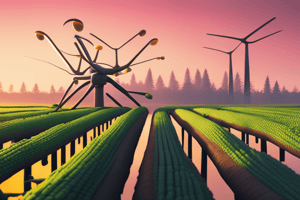Podcast
Questions and Answers
When was the first GM animal, 'M1' or 'Microcel,' born?
When was the first GM animal, 'M1' or 'Microcel,' born?
- 1990s
- 1960s
- 1970s (correct)
- 1980s
What is one of the benefits of genetic modification in animals mentioned in the text?
What is one of the benefits of genetic modification in animals mentioned in the text?
- Reduced life expectancy
- Decreased immune system functioning
- Increased need for antibiotics
- Improved animal health (correct)
What were scientists able to do in the 1970s related to genetic modification?
What were scientists able to do in the 1970s related to genetic modification?
- Transplant human organs into animals
- Develop advanced cloning techniques
- Create new combinations of DNA molecules (correct)
- Implement gene editing technologies
What is one of the promises attributed to the rapidly evolving field of genetic modification in animals?
What is one of the promises attributed to the rapidly evolving field of genetic modification in animals?
Why are GM animals developed to resist diseases?
Why are GM animals developed to resist diseases?
What is one of the global challenges that genetic modification in animals aims to address?
What is one of the global challenges that genetic modification in animals aims to address?
What is one potential benefit of genetic modification in animals as mentioned in the text?
What is one potential benefit of genetic modification in animals as mentioned in the text?
Which method of genetic modification allows precise editing of DNA sequences?
Which method of genetic modification allows precise editing of DNA sequences?
What ethical concern is related to animal welfare in genetic modification?
What ethical concern is related to animal welfare in genetic modification?
Which of the following is NOT mentioned as an ethical consideration related to GM animals?
Which of the following is NOT mentioned as an ethical consideration related to GM animals?
How can RNA interference (RNAi) be used in genetic modification?
How can RNA interference (RNAi) be used in genetic modification?
What is one area where GM animals are being used as mentioned in the text?
What is one area where GM animals are being used as mentioned in the text?
Flashcards are hidden until you start studying
Study Notes
Genetic Modification in Animals: Unraveling Altered Life
Throughout history, humans have been altering living organisms to better suit their needs. Today, genetic modification (GM) in animals is a rapidly evolving field that holds immense promise for advancing science, agriculture, and medicine. Let's explore the intricacies of this topic by examining its inception, applications, and ethical considerations.
A Brief History
Genetic modification of animals can be traced back to the 1970s, when the first recombinant DNA techniques were developed. Scientists found ways to cut and reassemble DNA molecules to create new combinations. The first GM animal, called "M1" or "Microcel," was born in 1974 from sperm cells with a single bacterial gene, engineered by Paul Berg and his colleagues.
Since then, researchers have been refining their techniques, aiming to improve the health and productivity of animals while addressing global challenges such as food security and environmental stewardship.
Applications of Genetic Modification
Genetic modification has led to a variety of applications, offering benefits in the following areas:
- Improved Animal Health: GM animals can be developed to resist diseases, reduce the need for antibiotics, and bolster immune systems, resulting in healthier and longer-lived animals.
- Enhanced Animal Productivity: GM animals can produce more eggs, milk, meat, or fiber than their non-GM counterparts, helping to meet growing global demand for food and textiles.
- Environmental Benefits: GM animals can be developed to reduce their environmental impact, such as by minimizing the need for pesticides or producing less waste.
- Medical Applications: GM animals are being used to produce medications, understand human diseases, and test new treatments.
Methods of Genetic Modification
There are several methods to modify the genetic makeup of animals, including:
- CRISPR/Cas9: This tool allows precise editing of DNA sequences. It's been used to develop animals with specific genetic traits, such as hornless cattle or pigs with increased cold tolerance.
- Transgenesis: This process involves the transfer of genes from one species to another, creating transgenic animals.
- RNA interference (RNAi): This method can be used to silence specific genes or switch them on/off, allowing researchers to study gene function in living organisms.
Ethical Considerations
The development and use of GM animals raise important ethical questions. Some concerns include:
- Animal Welfare: There's a risk that genetic modifications may lead to animals suffering from pain, distress, or reduced quality of life.
- Environmental Impact: GM animals could potentially escape or be released into the wild, leading to unintended consequences or gene flow with non-GM species.
- Food Safety: There's a need to ensure that GM animals are safe for consumption, with no potential risks to human health or the environment.
- Social Acceptance: The public must be consulted and informed about GM animals and their potential impacts, to ensure that their concerns are addressed.
Looking Ahead
As GM technology continues to evolve, the potential benefits and risks of this approach will become more apparent. With careful planning and consideration, genetic modification in animals may play a vital role in addressing global challenges, improving animal welfare, and enhancing human well-being.
By fostering open dialogue, strengthening regulatory frameworks, and encouraging innovative research, we can ensure that GM animals are developed and used in a responsible and sustainable manner. The future of genetic modification in animals is yet to be fully realized, but its potential to improve our world is undeniably promising.
Studying That Suits You
Use AI to generate personalized quizzes and flashcards to suit your learning preferences.




